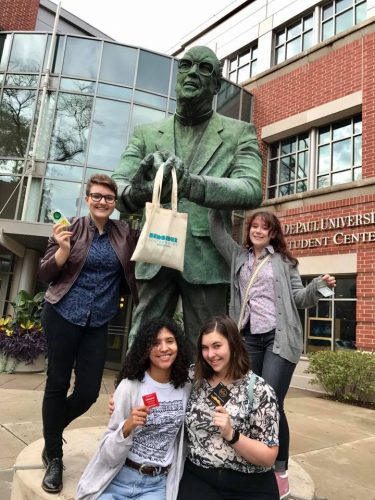Safe sex: Student group delivers condoms despite university policy against contraceptives
October 2, 2017
Imagine getting a condom delivered to your dorm as easily and efficiently as it is to order a pizza on your phone. Having sex is one of the many things that is just a part of student life, but some student organizations believe that DePaul is not doing everything it can to make sure students are practicing safe sex.
As DePaul is a private, Catholic institution, the policy on contraceptives is on a leash as tight as the Vatican’s. Students for Reproductive Justice (SRJ) is an unofficial student organization that decided to take matters into their own hands by giving away free condoms, even at the risk of being reprimanded by the university.
Text Jane is a free service open to students who are on campus and in need of birth control. SRJ’s members take turns going on delivery shifts each Friday night from 6 to 11 p.m. Students can request male and female condoms, dental dams, lube and even pregnancy tests.

A text message to SRJ’s shared Google Voice number will notify whoever is volunteering that evening, and they will meet the requester in a public place on campus. Text Jane’s peak service hours are around 8 p.m. each Friday night.
Text Jane came into fruition by Loyola student Melissa Haggerty. The student ruffled feathers at her own university last fall for demanding the institution to provide wider resources for sexual assault and access to abortion services and birth control.
Junior founding member Amy Weider said that when she met Haggerty, she was convinced to bring a similar initiative to DePaul.
“It kind of all started with the Text Jane idea,” Weider said. “We thought it was a good idea, but we thought, ‘We can do more than just this.’”
SRJ’s mission statement reads that they “aim to create spaces on and off campus to build community and solidarity with people and groups that are affected by reproductive injustices at DePaul,” and Weider clarified that condom distribution is only the first step of sex education.
Last Monday, SRJ held a general body meeting at one of their member’s off-campus apartment. There, founding member, Jennifer Holtz said that they were aware that they would likely receive pushback from the university and that from that point forward they would just be preparing for the worst.
“For me, it’s a lot of mental preparation, just knowing that what we are doing could come back to bite us,” Holtz said.

However, due to DePaul’s strict policies on contraceptives, the group fears being shut down. That being said, the fight for condoms on campus isn’t at all new.
In 2000, The DePaulia reported that fraternity Delta Kappa Epsilon’s condom distribution was halted at the annual Involvement Fair. Brian Ludwig, a then-active member of the fraternity, said that his organization was able to hand out about 50 condoms before being asked to stop. The fraternity admitted that part of it was an act of publicity for their organization, but DePaul was still quick to discipline the brothers.
Similarly, in 2015 DePaul Feminist Front created an online petition seeking to change the university’s contraceptive policy. The petition only reached 1,339 valid signatures of the 1,500 needed to be submitted 30 days prior to the next Student Government Association elections, kicking the initiative, which would have presented as a referendum question, off the ballot.
“From my perspective, the policy is that we are unable to distribute condoms to students for any reason mainly because of our connection to the archdiocese,” said Alyssa Rickman, coordinator of Health Promotion and Wellness (HPW). “I don’t see that policy changing in any sort of way.”
Although the Catholic Church has changed its stance on contraceptives in recent years, DePaul and other Catholic institutions likely will not budge when it comes to providing students with birth control.
“We physically can’t hand (condoms) out. We do care about our student’s sexual health, so not distributing condoms does not necessarily mean that we don’t care,” Rickman said. “It’s just a matter of our obligation to the archdiocese.”
Despite being aware of DePaul’s policy against contraceptives, SRJ hasn’t lost hope. Holtz and Weider said they plan to work with other student organizations, including Students Against Incarceration, to spread their message.
“There’s definitely a fear (…) because of what happened with the administration over at Loyola and I would hope that DePaul would care about its community and let us exist,” Holtz said. Haggerty was threatened with the removal of her scholarships at Loyola for using Text Jane to provide students with condoms.
Holtz said they are still cautious and don’t feel discouraged even as a group that is not affiliated with the university. Rickman said that because they are students at DePaul operating on DePaul property that they still need to comply by the rules.

In 2011, DePaul ranked last (#141) in Trojan’s Sexual Health Report Card, which uses on information on sexual health resources from 140 institutions — both private and public — to rank them. Over the years, DePaul’s ranking has risen before sinking back down again in 2016, placing the university at spot 125.
Most DePaul community members share skepticism over the results of Trojan’s report card, as did Holtz and Weider, but Weider noted that DePaul is also a private, for-profit institution, so SRJ is going to take DePaul’s policy and the reasoning with the same grain of salt.
Rickman said that connections the HPW office and the university has with outside resources, like the Center on Halsted, have been set up so that students can still find the resources that they need in order to practice having safe sex.
“I totally understand why there’s frustration around this policy,” said Hannah Retzkin, sexual and relationship violence prevention specialist at HPW. “(DePaul) is a private institution at the end of the day and it is a religious institution. That’s the policy that the institution has decided to uphold (…) and as student organization who are a part of the DePaul community they must uphold that.”
In an American College Health Association campus-wide survey distributed by HPW last spring, only 35.4 percent of the 368 students polled said that they had received prevention information on sexually transmitted diseases and infections. HPW said that they recognize there is more that needs to be done, but starting the conversation is the first of many steps.
“There are institutions (…) that don’t even talk about sex,” Retzkin said. “We don’t want that — but we have to uphold that the university has to follow this policy.”
Having HIV testing and events like “Sex In The Dark,” which will happen Monday, Oct. 2 at 6.pm., show that the university values sexual health, even if contraceptives cannot be delivered on campus, Retzkin said.
The Dean of Students Office was not immediately available for comment.





nikhilsunny / Jun 24, 2021 at 7:57 am
This blog has been is very informative. It’s a known fact that hiv prevention free condoms is possible, but you can never be too sure. This blog is for all those who take Sexually Transmitted Diseases too lightly. Understanding the symptoms of HIV can greatly help you in preventing it.